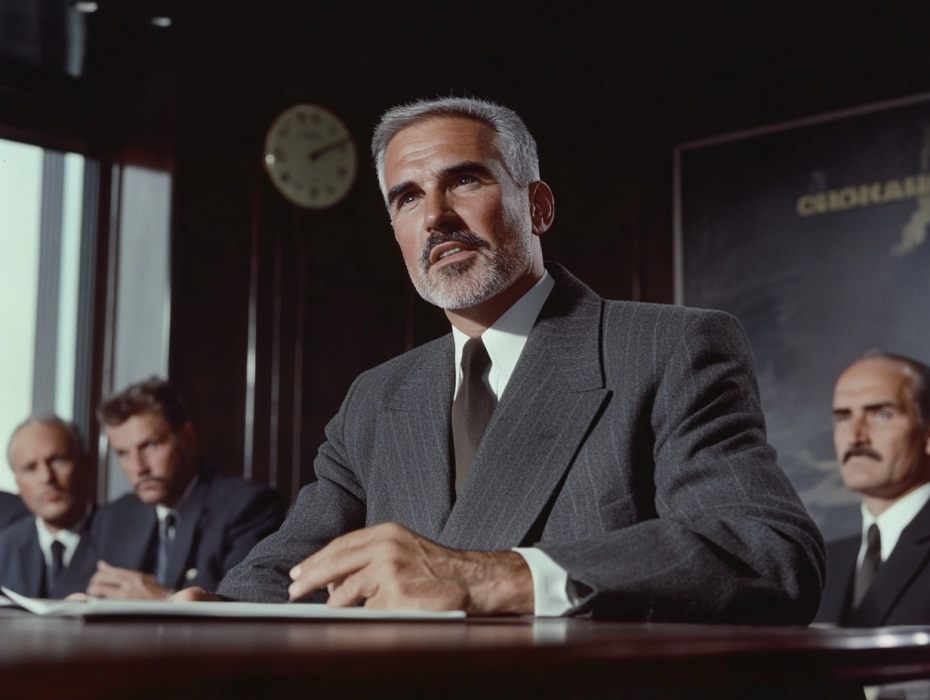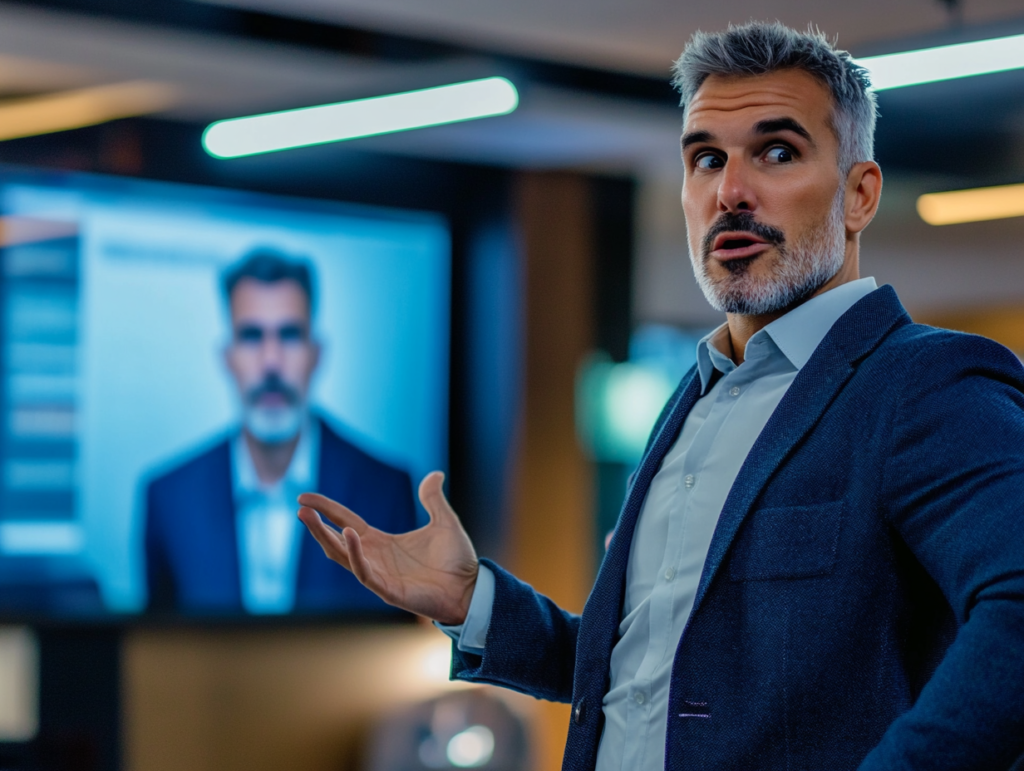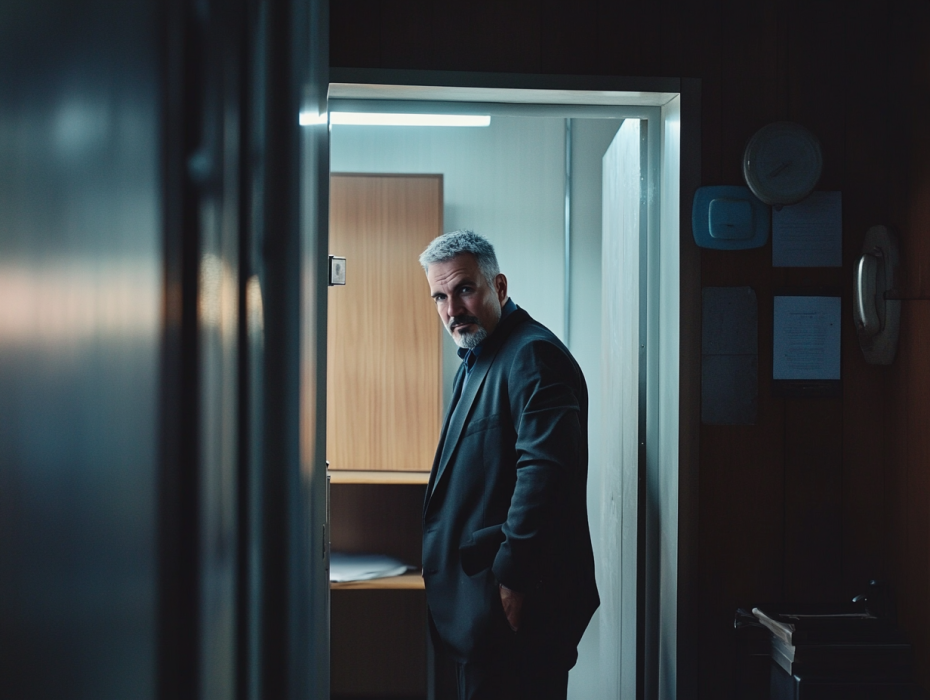The office was dead quiet, lit only by the sickly hum of fluorescent lights and the glow of a single monitor. Ethan Miller sat alone, sleeves rolled up, finishing what might be the most important presentation of his career—not because of what it would prove, but because of who it would expose.
One hundred and forty slides of numbers, charts, and perfectly balanced jargon gleamed on his screen. He attached the file, logged into Brad Collins’ account, something he’d done countless times before. Brad liked “streamlined workflows,” which usually meant Ethan completing his admin work. Tonight, that habit would finally pay off.
With trembling hands, he typed the subject line: Quarterly Strategy Presentation–Final Version, attached the deck, and pressed send. The confirmation ping echoed softly, with the finality of a gavel. Ethan leaned back in his chair, exhaled, and whispered with a smirk, “Here’s full credit to you, Brad. You have earned it.”
Six months earlier, Ethan Miller was just another overqualified, overworked analyst in an underlit office at Vertex Solutions—a consulting firm that worshipped PPTs more than people. His job was to translate chaos into charts, reality into jargon, and overtime into “collaborative excellence.” Nobody really noticed his work unless something broke.

His manager, Brad Collins, was everything Ethan wasn’t—loud, tan in winter, and constantly holding a reusable cup he never actually drank from. Brad’s calendar was a monument to performative show: “Leadership Sync,” “Vision Mapping,” “Lunch with CEO.” He never stayed long enough to finish any of them.
Brad called himself “a big-picture guy,” which was corporate code for someone allergic to work. He’d stride into meetings late, clap his hands, and ask, “So, where are we with that?” without ever specifying what that was. His smile was a brand and his conscience, an empty spreadsheet.

His super specialty was delegation. Brad dumped half his projects on Ethan with lines like, “You’re so good at the details, man,” and the rest on interns who quit before week two. Yet every Friday email still began, ‘Proud of the team for executing my vision this week!’
In meetings, he’d steal ideas midair. If Ethan continued on a subject, saying, “I was thinking we could—” Brad would interrupt, “Exactly! That’s what I’ve been telling you…” Then he’d repeat Ethan’s idea louder, with “strategic” inserted three times. The room would nod. Ethan would grit his teeth and smile.

Everyone in the analytics team knew the truth. Brad was a human mirror. He reflected whatever brilliance stood closest to him. But nobody challenged him. In corporate food chains, charisma beat competence nine times out of ten. The team had a nickname for him: Copy-Paste Collins.
Ethan told himself it didn’t matter. He got his paycheck, his quiet corner, and the satisfaction of seeing his models actually work. Recognition was overrated anyway, he thought. But that was until the day Brad took his biggest project and turned it into his personal stepping stone. That changed everything.

It started with the Henderson account—a billion-dollar client teetering on renewal. Ethan spent three nights in the office, running simulations, building forecasts, and formatting slides so persuasive they could make finance weep. He even skipped his sister’s birthday. When he was done, Brad called it “our deck.”
At the presentation, Brad strutted before the client like a TED speaker in a fancy suit. Every phrase Ethan had written poured smoothly from Brad’s mouth, followed by fake humility: “Of course, it’s all about the vision I’ve been pushing.” The client applauded. Brad basked in it like a lizard under a heat lamp.

Two days later, the CEO sent a company-wide email congratulating Brad for “saving the Henderson partnership.” The subject line read: Leadership in Action. Brad printed it and pinned it on the office corkboard. Ethan stared at it for a long time, then went back to fixing Brad’s broken Excel sheet.
When Ethan finally mustered the courage to ask about recognition, Brad smirked. “Buddy, learn to play the game. It’s not about doing the work, but about owning it.” He patted Ethan’s shoulder as though teaching a child to ride a bike, then walked off to lunch with upper management.

A few days later came the final nail in the coffin. Brad humiliated Ethan in front of the team for forgetting a deadline. “Timing matters, Miller,” he said. The interns giggled. Ethan said nothing, but remembered how he’d been pressured to finish Brad’s personal report instead of this one, even when he reminded Brad about the looming deadline.
Something inside Ethan, cold and sharp, replaced the usual resentment. For the first time, he wanted payback. It started with small fantasies during lunch breaks. Brad slipping on his own ego, Brad being caught lying in a meeting, or Brad finally being seen for what he was. But fantasies don’t stay small when you’re overworked and invisible.

At Friday drinks, his teammate Claire joked, “You handle all his work, really, I bet you know all his secrets, too.” Everyone, including Ethan, laughed. But the thought lingered, glittery and dangerous. For the first time, he looked at Brad’s stupidity not as a burden, but as an underutilized opportunity. Ethan began thinking in terms of logistics.
Brad’s biggest weakness was an overestimation of how well-liked he was. He could never see how easy it was for people to see through his manipulation and big talk. And perhaps that is exactly what Ethan could use to his advantage. Ethan decided to keep a close watch on Brad.

As the office emptied, Ethan stayed behind, making a few notes. He stared at the notes template, the cursor blinking like a heartbeat. For once, he was enjoying himself. He was going to work, not for, but on Brad. And by the time he was done, Brad Collins would own every single slide he prepared.
After that day, Ethan watched Brad with scientific precision—the way a nature enthusiast might observe an exotic, noisy bird repeating the same empty calls. Every email, each phrase, and every meeting interruption became data points. Ethan was busy experimenting with stupidity and power.

The results were consistent. Brad never checked numbers, only headlines. He’d scroll past spreadsheets like they were legal disclaimers and summarize them as “strong upward momentum.” The only graphs he liked were colorful ones. “Visuals sell,” he’d say, ignoring the fact that his visuals often contradicted the data.
He always relied on too many corporate buzzwords. Everything was “innovative,” “synergistic,” or “AI-driven,” even when it involved only coffee orders or printer settings. Once, he used “metaverse integration” to describe a client’s new Slack channel. Ethan stopped correcting him. There was no point in teaching syntax to a foghorn.

The funniest part was Brad’s trust. He never doubted Ethan’s work, never verified a formula, never questioned a chart. He’d brag, “I’m a big believer in empowering my team.” The translation was, “I have no idea what they’re doing, but if it works, it’s mine.” Ethan began to appreciate the irony.
He smiled to himself one evening as Brad forwarded yet another client deck without opening it. “I trust my people,” Brad had told the CEO. Ethan murmured under his breath, “Good. You should.” That night, the experiment gained a new hypothesis: blind trust makes the perfect weapon.

A week later, the company announced its next major pitch—a high-stakes quarterly review with the executive board and potential investors. The kind of presentation that could make or break careers. Everyone buzzed with anxiety. Everyone, that is, except Brad, who saw it as a red carpet invite.
This was also an opportunity that could determine promotions. Brad was one of the first to volunteer. “I’ll lead this,” he said grandly, glancing at Ethan. “You handle the data, champ.” Ethan nodded, already feeling the ghost of a smile forming. “Of course, Brad. You can count on me.”

“This is our shot at a regional lead,” he announced at the morning huddle, chest puffed out like a motivational speaker. “We’ll show the board what real innovation looks like.” The translation, Ethan knew, was We’ll show them what real plagiarism looks like.
By lunch, Brad had already begun delegating. “Ethan, you handle the analytics. Claire, polish the design. I’ll work on the delivery.” His “delivery” usually involved a mirror pep talk and half a dozen catchphrases rehearsed in the restroom. “You’ve got the brains, I’ve got the charm,” he declared proudly.

The team exchanged glances. They all knew the pattern: Ethan would do the heavy lifting, Brad would slap his name on it, and somehow the company would call it leadership. But this time, Ethan nodded with perfect calm. “Sure, Brad. I’ll make something unforgettable.”
That night, as the office lights dimmed and the hum of computers faded, Ethan stayed behind. He opened the presentation template, staring at the blank slide like a fresh canvas for justice. For the first time, he would create the perfect cocktail for disaster, one bullet point at a time.

The plan was elegant in its simplicity. Ethan would give Brad exactly what he always wanted—a shiny deck full of big words and bigger promises. There would be two versions, indistinguishable by filename, differentiated only by substance. One would win promotions. The other would end careers. He smiled just thinking about it.
Version A was a masterpiece. Crisp design, clean graphs, real projections. It was the kind of deck that could make investors applaud and analysts sit up and take note. Ethan worked on it with his usual precision, right down to the placement of commas and the alignment of footnotes. Professional pride mattered.

Version B, however, was performance art. It was a chaotic blend of meaningless metrics and inspirational nonsense. It claimed a massive growth in “customer satisfaction” and proposed “empathy quantification” as a future KPI. In short, it was jargon, presented with an extra dressing of stupidity. Brad’s favorite flavor.
He inserted conflicting numbers, duplicated slides, and even one bar chart that compared “passion” to “profits.” On one of the later slides, he added an AI photo of Brad holding a coffee mug with World’s Best Boss written on it, captioned “Visionary Leadership.” It was petty, but perfect.

When he finished, Ethan saved both files side by side: Presentation_Final.pptx and Presentation_Final_Brad_Approved.pptx. He didn’t need to guess which one Brad would open. He could already hear his manager’s voice saying, “Love the bold thinking!” as he skimmed right past the disaster.
The next morning, Ethan uploaded the “bad” version to the shared folder, careful to timestamp it with the latest save. Then he added a fake comment thread beneath the upload: “Checked with Finance” and “Legal confirmed language.” Authenticity through bureaucracy—the one thing Brad never questioned.

By mid-afternoon, a Slack notification popped up. Brad Collins: Got it, champ. Genius as always. I’ll polish the delivery tonight. Ethan leaned back in his chair, taking care to delete the fake thread of verification. Brad polishing something was as likely as him reading it. Still, it was nice of him to confirm the bait.
He deleted the good version from the visible folder and backed it up privately. It would be his insurance. Then he walked past Brad’s office, watching through the glass as Brad leaned back, feet on the desk, scrolling through the first slide with exaggerated satisfaction. “This is gold,” he said aloud to himself.

Ethan smiled. “Solid gold,” he murmured under his breath. The kind that will sink you. He returned to his desk and closed Slack for the evening, the quiet satisfaction of impending justice wrapping around him like a warm coat.
As he powered down, he thought about what might happen when Brad presented it. Confusion? Laughter? Fury? He almost felt bad for the others in the room. Almost. But corporate collateral damage, he decided, was a necessary part of evolution. The ecosystem had to correct itself eventually.

The following days brought flickers of doubt. What if someone double-checked the deck before the meeting? What if IT logs revealed he’d made edits? Or worse, what if Brad somehow twisted it back on him—as he’d done a dozen times before? Ethan could almost hear the accusation already forming.
He tried to shake it off, but anxiety clung stubbornly. Every time an email from HR popped into his inbox, his heart skipped. Every hallway chat between managers made him pause. It wasn’t guilt exactly—more like preemptive paranoia, the natural reflex of an employee too used to blame.

That evening, Brad stopped by his desk, grinning with paternal smugness. “Hey, buddy, great job on that deck. You really made me look good.” Ethan’s jaw tightened. There it was again—the ownership, the condescension. But this time, instead of anger, he felt only calm amusement.
He remembered every time Brad had said, “Don’t CC me next time, it clutters my inbox.” Every time, he’d been made to book Brad’s flights, fetch his coffee, or rewrite his half-baked ideas. The injustices stacked neatly in his mind like slides in a presentation titled Reasons He Deserves This.

By the time Ethan got home, any trace of guilt had dissolved completely—like sugar in espresso. What was one more unethical act in a company that rewarded the unethical daily? He wasn’t breaking the rules. He was just playing the game the way Brad taught him.
In the days leading up to the presentation, Brad was insufferable. He strutted around the open floor, rehearsing phrases like a motivational parrot. “Let’s leverage synergies for scalable ideation!” he’d shout at interns, who nodded with blank eyes. Ethan could barely contain a smirk. It was already poetry.

Brad even started giving impromptu pep talks to the team. “We’re about to blow their minds,” he said, standing by the whiteboard. “This presentation? It will revolutionize the industry.” Ethan, sipping his coffee, muttered softly, “You have no idea.”
He watched as Brad printed multiple color copies of the deck, punched holes in them neatly, and placed them in a leather binder embossed with his initials. He carried it everywhere, like a preacher with his holy text. “The future of Vertex is in these slides,” he boasted. Technically, he wasn’t wrong.

When Ethan offered to “check everything one last time,” Brad waved him off with exaggerated confidence. “Relax, kid. Daddy’s got this.” The phrase made Ethan laugh out loud for the first time in weeks. He covered it with a cough and said, “Of course, Brad. You got this.”
On the eve of the big day, Ethan stayed late again—not out of obligation, but anticipation. The office was quiet except for the distant hum of servers. He walked past Brad’s empty desk, glanced at the binder resting there, and whispered, “Sleep well, Final_Brad_Approved. Tomorrow, you’re going live.”

The boardroom of glass walls, chrome fixtures, and a table long enough to host a small parliament gleamed under fluorescent precision. Platters of overpriced pastries waited untouched beside carafes of ethically sourced coffee. This was corporate theater at its finest, and today’s show had a very special star.
Brad Collins arrived ten minutes early, wrapped in a blue wool suit and fake confidence. His tie matched the smug curve of his grin. He greeted everyone with firm handshakes and empty phrases: “Excited to align!” “Ready to innovate!” The only thing tighter than his suit was his ego.

Ethan entered quietly, laptop in hand, and chose a seat at the far end of the table— close enough to observe, but far enough to feign detachment. He opened an email window and began typing nonsense sentences, a perfect disguise for the nervous anticipation he was feeling.
Brad plugged in the laptop, cleared his throat, and straightened his tie for the tenth time. “Good morning, everyone,” he said with a flourish that implied this was a TED Talk, not a quarterly review. “Prepare to be disrupted.” Ethan took a slow sip of coffee. Showtime.

The opening slides were harmless enough—the company logo, a tagline, a blue gradient that screamed “professional.” Brad’s voice boomed confidently as he introduced “a revolutionary approach to client engagement.” Ethan glanced at the clock. If his math was right, the implosion would begin in about ten minutes.
Slide fifteen hit like a grenade. A massive bar chart promised a “4000% increase in customer cow relations.” Murmurs rippled through the room. Brad grinned proudly. The CFO tilted his head. “Sorry, Brad—customer cow?” Brad’s smile faltered. “It’s, uh… a new metric.”

He clicked to the next slide. The graph spelled “WOW” in diagonal bars. A few executives exchanged looks; someone stifled a laugh. “As you can see,” Brad stammered, “we’re redefining engagement through… sentiment analytics.” The CEO’s pen stopped moving. Ethan pretended to take notes diligently.
The slide after that one displayed a stock image of a man shaking hands with a robot under the title Empathy Through Automation. “That’s our future,” Brad declared, voice cracking slightly. “Human connection at scale.” The HR director coughed into her sleeve. The CIO whispered to the CFO, “Is he serious?”

By the time the next slide appeared—a photo of Brad himself sipping coffee under the heading Visionary Leadership—the room was tense with disbelief. The silence was so thick you could hear the air conditioning. Ethan stared at the screen, fighting the urge to grin.
The CEO finally spoke. “Brad… did you personally review this material?” Brad adjusted his tie, beads of sweat forming near his temples. “Of course,” he lied. “This represents months of team effort.” He clicked again. The next slide featured a bullet list reading, “1) More Synergy 2) Less Boring 3) Profit???”

The COO leaned forward. “Is that… a question mark?” Brad froze. “It’s… aspirational.” The word hung in the air like a broken drone. The room collectively leaned back in their chairs. Someone in finance muttered, “Is this satire?” The silence that followed was almost compassionate. Almost.
Brad fumbled for the remote, clicking wildly as if speed could reverse embarrassment. Slide thirty was a pie chart labeled Sources of Success divided into slices named “Luck,” “Vibes,” and “Brad’s Vision.” The HR director covered her mouth. Ethan pressed his lips together until they trembled.

Desperation drove Brad faster. Each new slide dug deeper into absurdity. One included a meme of Leonardo DiCaprio raising a champagne glass with the caption Cheers to Q2 Wins! Another featured an animated GIF of fireworks that refused to stop looping. “This is… dynamic design,” Brad said weakly.
The CFO’s voice cut through the chaos. “Brad, are you actually presenting meme content to the executive board?” Brad attempted a chuckle. “We’re staying culturally relevant.” His voice squeaked on “relevant.” A single laugh escaped someone from HR. The CEO’s glare silenced it instantly.

When slide forty appeared—a pyramid diagram labeled Hierarchy of Innovation with “Brad” at the top and “Everyone Else” at the bottom—the room broke. A nervous chuckle spread across the table, followed by coughs and fake throat-clearing. Ethan watched it unfold, the corners of his mouth twitching.
Brad straightened suddenly, his tone defensive. “As you can see, this presentation demonstrates bold thinking outside traditional frameworks.” The CEO, expression unreadable, leaned back in his chair. “Brad,” he said slowly, “who validated this data?” The question cut like glass. Brad’s jaw tensed. “Ethan did. He always does…”

Every head turned toward the far end of the table. Ethan looked up from his laptop, his face a perfect portrait of mild confusion. “Uhm, I sent you the metrics in a separate file, remember?” he asked politely. The CEO’s gaze flickered between them. Brad’s color drained. His mouth opened to say, “But Ethan, you always prepare it…”
The CFO flipped through printed copies, stopping at the chart that spelled “WOW.” “You’re telling me Finance confirmed this?” Brad stammered. “It must’ve been a draft mix-up that Ethan did not…” The CEO’s tone was calm, too calm. “A mix-up presented to our investors?” Brad swallowed hard. The silence that followed was merciless.

Brad began babbling about how his staff were abusing the rights and freedoms he always gave them. The CEO said, “Well, if they do all the work, without your supervision, then no point retaining you, is there?” The meeting wrapped early with a lethal promise: “We’ll regroup on this next week.”
When the executives left, Brad stood alone by the screen, staring at his own pixelated face under Visionary Leadership. Ethan closed his laptop and slipped quietly from the room. Outside, the morning sun caught on the glass walls of the lobby, scattering reflections. Ethan smiled. Justice, he thought, served in beautiful slides.

By afternoon, the rumors had already spread faster than any memo. People from other floors dropped by the analytics wing “just to borrow a stapler.” They wanted to see the man who’d presented customer cow relations to the board. The nickname “Mr. 4000%” was born before lunch.
By Tuesday, HR announced a “leadership restructuring initiative.” Brad was quietly reassigned to “Process Optimization Support,” which everyone knew was corporate purgatory. His new desk faced the supply closet. The only process he optimized was ordering printer toner.

When the email came naming Ethan as “Interim Analytics Lead,” nobody was surprised. Even the interns clapped. The CEO congratulated him in person, calling his “quiet professionalism a stabilizing influence.” Ethan smiled modestly. “Just trying to bring clarity to the data,” he said. Inside, he was still grinning.
Brad didn’t quit. He lingered, perhaps hoping for redemption or maybe just Wi-Fi. Every time Ethan passed his desk, Brad gave a tight smile that said both “Remember when I was your boss?” and “Please don’t remind me.” The power dynamic had never felt more balanced.

Under Ethan’s leadership, the department actually started functioning. Meetings ended on time. People left before midnight. Buzzwords were banned under threat of coffee duty. When someone accidentally said “synergy,” the room groaned collectively. The culture detox was slow, but steady.
Brad tried to participate, awkwardly repeating phrases he thought sounded humble. “Hey team, let’s stay grounded,” he’d say, as if humility were a language he barely spoke. Ethan responded kindly, always addressing him as “Mr. Collins,” the same title Brad had once insisted on. Corporate karma had good timing.

The office felt lighter now, with genuine laughter by the coffee machine, and playlists instead of tension. Someone even printed the “Profit???” slide and taped it to the breakroom fridge. Above it, Claire had written in marker: Innovation in its purest form. Brad avoided the fridge for a week.
Ethan sometimes caught himself wondering if he’d gone too far. But then he’d remember the years of stolen credit, the late nights spent fixing Brad’s errors, and the smirk that followed every undeserved applause. No, he decided. Justice wasn’t cruel, just efficient.

One evening, as the office emptied, Brad appeared at Ethan’s door clutching a manila folder. His usual swagger was gone, replaced by careful deference. “Hey, Ethan,” he began, voice low, “if you need any help with the next board deck… I can run it by you first.”
Ethan looked up, studying the man who once made him fetch coffee and erase his name from slides. Brad’s collar was slightly wrinkled, his confidence deflated but not entirely erased. “Thanks, Brad,” Ethan said evenly. “I’ll let you know if I ever need a second pair of eyes.”

When Brad left, Ethan leaned back in his chair, smiling faintly. He opened the clean, factual presentation on his screen—without sabotage, or deception, just good work finally wearing his own name. For the first time in years, he didn’t need revenge. He’d already won.
